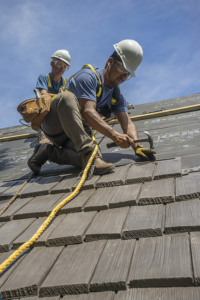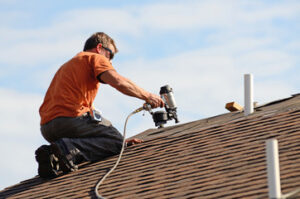Roofing Company Baton Rouge can only be successful if it makes more money than it spends. This is why it’s important to meet with a trusted accountant right from the start.

Determine if you want to run your roofing business as a sole proprietorship, partnership or corporation. Discuss this with a lawyer in your area.
A good roofing company is one that delivers high quality work and has a reputation for being honest, fair and reliable. They will also stand behind their work and provide a warranty. This is an important part of any business, but it’s especially important for roofing contractors. It protects the business from legal issues and allows it to run smoothly.
Choosing a name for your roofing business is a big decision. The name you choose should be memorable, easy to pronounce and evoke a positive image. The roofing industry is competitive, and it’s vital to differentiate your brand from others to increase sales and build trust with customers. A great way to do this is by focusing on the brand’s heritage, values and unique features.
Small businesses owners wear many hats, including chief brand officer. It’s important to have a strong and compelling brand that can be used across all marketing channels. A well-known and respected brand can increase your chances of getting referrals, winning new business, and expanding into new markets. It’s also essential to have a solid plan to help you get the most out of your marketing budget.
When hiring a roofing contractor, you should look for a detailed written estimate that lists all the services to be provided and materials needed. The cost should include labor and any applicable taxes. A trustworthy roofing company will also offer a strong manufacturer’s material warranty that lasts for up to 30 years and a workmanship guarantee of at least 5 years.
Homeowners should always request a roof inspection before selecting a roofing contractor for their project. A reputable roofing company will take the time to inspect the roof, make recommendations and discuss options. They will also provide a full proposal with a breakdown of the costs. Avoid companies that refuse to provide a written estimate or offer an unnecessarily low bid.
Reputation
Roofing is an inherently rugged business, and the risks of property damage to customers’ homes or cars, worker injury and lawsuits are all real. That’s why it’s important for roofers to take the necessary steps to protect their businesses with proper insurance.
Developing a good reputation in the roofing industry is essential for small businesses, and it’s often more straightforward than it seems. For example, many new entrepreneurs struggle with the process of establishing legal coverage and accounting for their businesses, but it’s much simpler than they think, especially with modern software, helpful accountants or financial advisors, and online or in-person resources available within the community.
A well-branded name is also an important component of a company’s reputation, as is asking satisfied customers to post reviews on services. In addition, a well-signed vehicle and branded business cards can help spread the word about a new roofing company’s services. Lastly, a credit card processing account can be a big boon to roofing companies, and it’s generally easier and cheaper than one might expect.
Insurance
A roofing company should have the proper insurance coverage to protect its employees and assets. A business insurance expert can help a roofing company determine what policies are needed for the specific business. Generally, roofing contractors should carry general liability and workers’ compensation insurance. Workers’ compensation insurance pays for medical bills, wage loss benefits and death benefits in the event of a work-related accident. This type of policy is almost always mandatory in all states and provinces. In addition to this, a roofing company should also have commercial auto insurance and builder’s risk insurance. This type of insurance provides coverage for construction projects against fire, lightning, theft and vandalism.
If a client or third party claims that a roofing contractor’s work has caused damage, a general liability policy can pay for repairs and legal fees. It can also cover reputational damage. In addition, a roofing company should have errors and omissions insurance, which is also known as professional liability insurance. This covers the cost of a lawsuit if a client claims that a roofing job was not completed or done properly, even if the claim has no merit.
Some roofers also need a surety bond, which is not technically an insurance policy but provides a guarantee that the roofing company will complete a project according to its contract. The cost of a surety bond depends on the size of the contract and the amount of money that is guaranteed.
In addition to these types of policies, a roofing contractor may need workers’ compensation insurance for its employees. This type of policy pays for medical bills and wages for employees who are injured on the job. Depending on the state, it may also cover funeral costs and death benefits. Roofing companies that often travel between jobs need a commercial auto policy, which insures vehicles and trailers. They may also need inland marine insurance, which covers equipment that is in transit between locations. Finally, a roofing contractor should consider purchasing cyber liability insurance to help protect its computer systems from data breaches and hacks.
Warranty
A warranty can mitigate the risks of a roofing project. It can also save you money on repairs or replacement costs should something go wrong. A good roofing contractor will offer a warranty for the work they perform, as well as the materials used in their projects. However, the type of warranty will vary from contractor to contractor. You should always research the types of warranties available before hiring a roofing company.
Manufacturer warranties typically cover roofing materials and can last up to 30 years. They typically do not cover workmanship, and improper installation can void the warranty. Contractor warranties generally cover workmanship and are backed by the roofing contractor. They may be one to ten years in length. Enhanced or extended warranties combine both the material and workmanship coverage of manufacturer and contractor warranties. They usually have a longer coverage period than standard manufacturer or contractor warranties.
Insurance is an important part of running any business, and a roofing company is no different. Having the right insurance can help protect your business from lawsuits, damage to property and injuries to employees. There are many types of insurance that can be purchased, but the most important for a roofing company is general liability and workers’ compensation.
Some roofing companies will offer a workmanship warranty in addition to the standard manufacturer labor and material warranties. This warranty can be especially helpful if you are using a unique or difficult roofing material that does not come with a standard material warranty from the manufacturer.
A workmanship warranty is a guarantee that the roofing company will do quality work and will correct any mistakes made during the project. This warranty can be in addition to a standard manufacturer’s warranty on shingles, or it can replace it entirely.
Before hiring a roofing company, make sure they are certified by the manufacturer to install their products. If a roofing company is not certified, the manufacturer will not honor their warranty, so this is a very important factor to consider. It’s also important to check the manufacturer’s requirements for registering your warranty, as they will only honor it if it is registered within a specific window of time.


